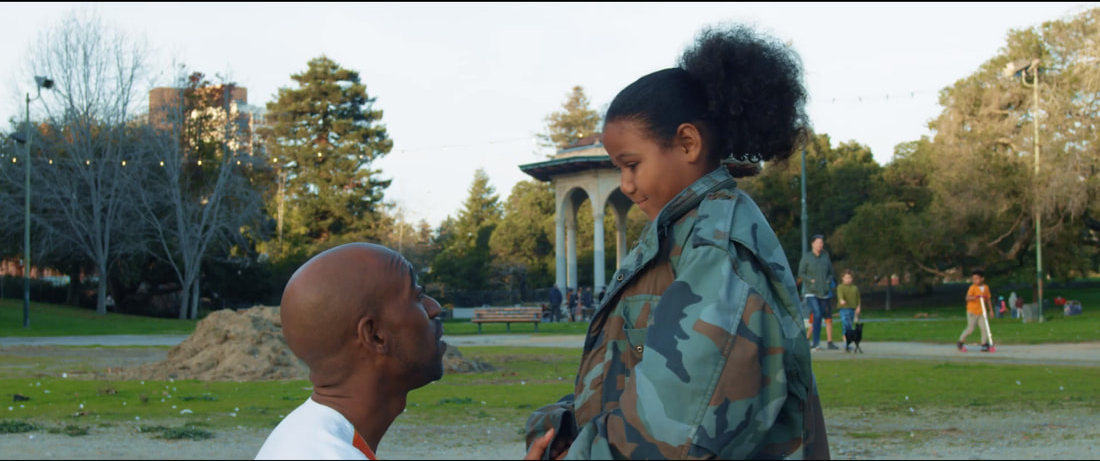
by JR Valrey
Adimu Madyun’s film “Tent City” is a fictional yet passionate look at what poverty and the housing crisis in Oakland is doing to vulnerable Black families. The locally shot film was selected to be a part of this year’s Oakland International Film Festival and is by far in my top five favorite films of the festival.
With Oakland’s current mayor Libby Schaaf furthering the 10k plan of former mayor and gentrification visionary Jerry Brown – bringing 10,000 affluent residents to downtown Oakland – it is important for the Black community to have the types of discussions that will force us to realize our reality and to do something about it. Watching and discussing “Tent City” is a necessary first step in fighting to keep roofs over our community’s heads.
Check out filmmaker Adimu Madyun as he guides us through the ingredients of sweat, love, depression and motivation that eventually were cooked into creating this important and well needed piece of cinema.
M.O.I. JR: What motivated you to write “Tent City”? And what made you write a movie from the perspective of a little girl that covers the gentrification, poverty and mental illness brought about by capitalism?
Adimu Madyun: My own grief and uncertainty allowed me to create this film. I was suffering from trauma and trying to deal with it by overworking myself. I got to a point my body and spirit just stopped.
I stopped working for three months and my ancestors led me to the lake every morning to allow the forces of nature to heal me. On my walks, I noticed the abundant amount of Black men and boys who we’re also walking the lake looking for answers in different stages of their own healing. Many of them also lived at the lake in tents.
I know their story. Our story needed to be told. As a father of four daughters, I would push my youngest daughter around the lake in the stroller every morning. She was part of my inspiration and my healing.
She assisted me in turning my pain into prosperity.
M.O.I. JR: How do you think the housing crisis in the Bay Area affects mental health and families?
Adimu Madyun: The housing and mental health epidemics affect everyone. No one is beyond being afflicted with a mental health crisis; trauma and grief are real.
In regards to housing and mental health, the absence of a stable household is devastating. It can literally drive you crazy. The family suffers tremendously when a loved one is suffering with a mental health disorder or homeless. It can destroy a family for generations. Destruction of the family structure is destroying communities.
M.O.I. JR: How long did it take to write this piece? How long did it take to shoot it?
Adimu Madyun: It took me three months of walking the lake crying, singing and having vulnerable conversations with my brothers and sisters about our collective and individual pain around the mental health and housing epidemics.
M.O.I. JR: How have Bay Area crowds responded to “Tent City”?
Adimu Madyun: A lot of tears and vulnerable reflection. The film has moved people in an amazing way. Our goal of restoring faith, hope and humanity is happening every time the film is screened.
M.O.I. JR: What kind of feeling are you trying to invoke in your audience with this film?
Adimu Madyun: Vulnerability. I want people to feel safe, to remember we are the solution. That it’s ok to use our grief and pain to tap into collective and individual solutions. When we are vulnerable, we can speak from the heart. We can speak truth.
M.O.I. JR: Where has “Tent City” screened so far?
Adimu Madyun: As of date, only four screenings in the Bay Area and one in Miami on Aug. 31, and calls have been coming in from around the nation.
M.O.I. JR: Why did you cast a real father and daughter to play the father and daughter in your film?
Adimu Madyun: The film is its own entity. It has its own spirit and energy. The film chose who it wanted. The first people were Sizwe and Saba. I remember telling Sizwe the film wanted him and his daughter, and nobody else could play those roles.
M.O.I. JR: How do you see the art of filmmaking?
Adimu Madyun: Filmmaking is spiritual for me. It’s the documentation of the messages coming from the ancestors and Orisa.
M.O.I. JR: Can you tell us about your other film, “So Beautiful,” that is also in this year’s Oakland International Film Fest?
Adimu Madyun: “So Beautiful” is an amazing journey into the power of names and ancestral destiny.
M.O.I. JR: What does it mean to you to have your film screened at the Oakland International Film Fest? Why did you apply to this festival in particular?
Adimu Madyun: It’s a great honor to screen at OIFF. I have tremendous respect for David Roach and all the amazing people at OIFF. Over the years I have screened about four different films at OIFF.
M.O.I. JR: When and where do your films screen?
Adimu Madyun: “So Beautiful” on opening night at the Grand Lake Theater, 6-8 p.m., and Sept. 26, 6-8 p.m., at Jack London.
“Tent City” screens Tuesday, Sept. 24, 6-8 p.m., at Jack London.
M.O.I. How do people stay in touch with you?
Adimu Madyun: IG @WolfHawkJaguar, FB WolfHawkJaguar and Twitter @WolfHawkJaguar.
The People’s Minister of Information JR Valrey, journalist, author and filmmaker, can be reached at blockreportradio@gmail.com or on Facebook. And tune in to BlockReportTV on YouTube.





